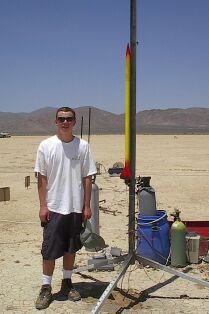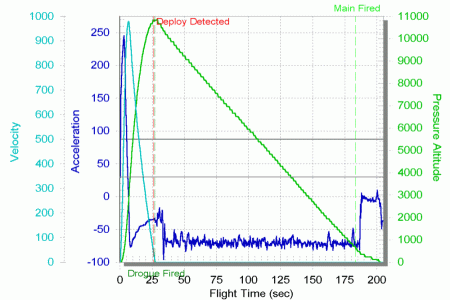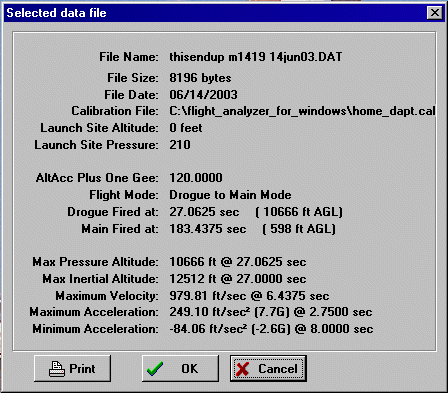| Construction Rating: | starstarstarstarstar_border |
| Flight Rating: | starstarstarstarstar_border |
| Overall Rating: | starstarstarstarstar_border |
| Manufacturer: | BlackSky  |
Brief:
Recording accelerometer with dual deployment recovery feature.
Construction:
The blacksky (little b) ALTACC 2A is a recording accelerometer unit with dual deployment, meaning it can deploy a drogue chute at apogee and a main chute at 500 feet. It is solidly built and uses surface mount components for extra durability.
The unit is very easy to use. It attaches directly to the airframe wall of your rocket with two 6-32 machine screws spaced on 3" centers. When drilling the mounting holes, one also needs to drill holes for the status LED and the arming screw. blacksky provides a drilling template for this. The battery is mounted directly to the back of the board using a very sturdy battery mount. After installing the battery, the pyro charges are hooked up, the unit is powered on with a jumper, and installed into the rocket. A nice feature would be to have selectable main deployment altitudes; blacksky has solved this problem with the release of the ALTACC 2C (what happened to version 2B? I'm not sure -- I guess it was not 2B ;)) You arm the unit once the rocket is on the pad and vertical so as not to trigger the accelerometer. The arming screw is on board and the unit does not need any external switches. Once armed, you can check for continuity easily by sighting the super-bright status LED. I found it easy to read the LED even in the bright desert sun.
Construction Rating: 4 out of 5
Flight:
I have used the ALTACC in many rockets. It has always worked for me and produces great data. Some of my more exotic flights with it have been with a HyperTek L625, an M1419W, and a looping flight on a RATTWorks I80. In each case, the ALTACC successfully fired the deployment charges.
The unit will produce four minutes of data. This can be downloaded to your PC or Palm unit using the provided serial cable (adapter needed for Palm use). You can download the data using either a Windows GUI and graph it there, or you can get the raw data in a DOS program and then export it into Excel to determine many more parameters. The Windows software is easy to use and is very flexible, providing you with a graph function that can draw any different equation you input using the data. It can even give you a live readout of current conditions.
 One of my concerns with the unit is its "drogue detect" feature. Basically, if it loses continuity on the drogue circuit sometime before apogee (as it detects it), the unit will fire the main at apogee. I had this happen to me twice with my 4" Arcas rocket. The solution is to short out the Drogue terminal with a 10Kohm resistor in parallel with the electric match. This way, continuity is always sensed across the drogue terminals. Also, the unit does not beep out altitude after flight -- you must download to your computer to read the altitude (note: this was also fixed on the 2C version). These are minor annoyances, however, and the pros of the unit well outscore the cons.
One of my concerns with the unit is its "drogue detect" feature. Basically, if it loses continuity on the drogue circuit sometime before apogee (as it detects it), the unit will fire the main at apogee. I had this happen to me twice with my 4" Arcas rocket. The solution is to short out the Drogue terminal with a 10Kohm resistor in parallel with the electric match. This way, continuity is always sensed across the drogue terminals. Also, the unit does not beep out altitude after flight -- you must download to your computer to read the altitude (note: this was also fixed on the 2C version). These are minor annoyances, however, and the pros of the unit well outscore the cons.
Flight Rating: 4 out of 5
Summary:
This unit is very easy to use, reliable, is mach-immune, and has dual deployment. It does not require any switches or external wiring harnesses--the unit is self contained. The software is excellent and you have the option of downloading to a Palm Pilot. However, you must insure that you short out the drogue terminal with a 10Kohm resistor in parallel with your e-match to insure the main isn't fired at apogee along with the drogue. Also, the unit does not beep out altitude after a flight. Pros and cons aside, this is a great first accelerometer.
Overall Rating: 4 out of 5
Sponsored Ads
 |
 |











